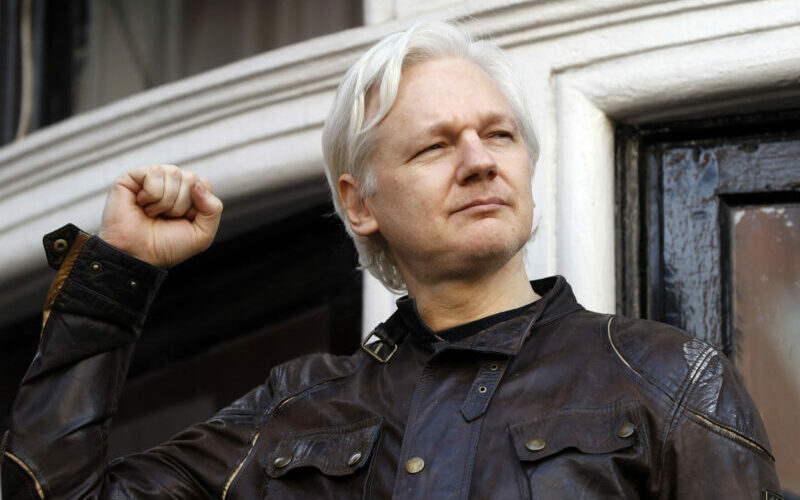
Our mainstream media have treated Julian Assange as the bad guy for over a decade. Which is where the virus again raises its ugly head.
We are over the pandemic, and we don’t need another article about it. Since Freedom Day, relieved Australians have been allowed to go out, infect others, or get themselves infected as they please. Surely this should mean freedom from saturation pandemic media reporting too.
For many in the mainstream media, working from home perhaps, covering the virus with its peaks and troughs and variants became easy and habitual. ABC health reports and even many news broadcasts often consisted of nothing else. Fearful readers apparently wanted news stories about COVID-19, which in turn made them more fearful. The media were comfortable, sure that they were giving the public what it wanted.
For two years, even as news outlets shrank and staff were sacked, reports which suggested that there were worse existential threats than the virus were pushed down the list, or off it altogether. Australia’s record-breaking debt, our contribution to global heating, or the dire consequences of provoking war with China, for example, didn’t compete for space.
Instead of the media telling us what our governments were up to, we usually heard bits about it after the event — like whose electorate got what grants and with what justification, or what new security legislation had been rushed through Parliament to ‘keep us safe’.
The same information vacuum has swallowed AUKUS. We still don’t know what we will really get from the “forever partnership”, how many billions of dollars it will cost us, and when we can expect to get it. If our opposition spokespeople, wearing their bipartisan masks, have asked ministers how AUKUS will keep us safe, they haven’t shared the answers.
One significant story in the news vacuum does concern staying safe from the virus. In late August, Human Rights Watch reported that being in jail in New South Wales is seriously unsafe. While we were concerned about aged care homes, few expressed alarm that only 21 per cent of prison inmates were fully vaccinated, and 42 per cent had received only one dose.
As well, many prisoners live in close proximity to others with underlying health conditions; ventilation, sanitation and hygiene are often poor; and health care inadequate. Some are locked up for 23 hours a day as a precaution against the virus. These prisons, and presumably others around the country, are potential hot spots for infecting inmates, visitors and staff, let alone for mental illness.
Do such places keep the rest of us safe? Clearly not: but now we’re free, do we care? On Freedom Day, luckily for an unnamed policeman who shot an Indigenous woman dead in Geraldton in 2019, he was found not guilty by a jury and released. How fortunate too for Eddie Obeid who was found guilty, only to be immediately released on bail because he might catch COVID-19 in prison.
A study in the United States showed that prisoners are three times more likely to die from COVID-19 than members of the general population. In the UK, too, infections in jails were three times higher than on the outside. In England and Wales, 118 prisoners died from the virus between March 2020 and February 2021, a study by University College London reported in The Lancet.
The UK and Australia are parties to the UN Convention on Economic and Social Rights: the US has not ratified it. The Economic and Social Council Committee (ECOSOC) reminds all parties that they are “under the obligation to respect the right to health by, inter alia, refraining from denying or limiting equal access for all persons, including prisoners or detainees, minorities, asylum-seekers and illegal immigrants, to preventive, curative and palliative health services” (my emphasis).
Just in time, for on Wednesday, October 27 an appeal from the US, seeking extradition of Julian Assange, will be heard at the High Court in London. While we were in lockdown, many of us may have missed the latest revelations that the CIA had plans to kidnap or even kill Assange. Our media didn’t tell us much about them, nor ask President Joe Biden what he intended to do about such apparent conspiracy against an Australian citizen.
The same silence reigns in the UK, where the BBC repeatedly presents Assange as someone who is trying to evade justice. Judges warn him he is not above the law, even though he is guilty of nothing and accused of nothing. Nina Cross recently called the process a “slow assassination by the UK and US authorities”. In The Indicter, she added that the BBC is serving “the interests of the British state apparatus, enabling a culture of impunity by spoon feeding its audience government narratives, manipulating perception, and promoting ridicule and disdain”.
Spoonfed audiences in the US and Australia go along with the BBC, accepting that Assange is the bad guy, a narcissist, and a traitor, so he must be getting the treatment he deserves. Our mainstream media have treated Assange’s case this way for over a decade. Which is where the virus again raises its ugly head.
A guilty Obeid is spared exposure to COVID-19 in jail, while an innocent Assange faces “slow assassination” in Belmarsh, where infection rates are high. Justice is supposed to be blind and impartial. Politics is not. In Assange’s case, it’s clear which is in control. AUKUS rules.




